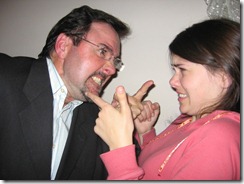 The Bible is a practical book, teaching us not just who God is but how He wants us to live. Within the pages of Scripture we see both principle and example of many different life choices. The one I want to focus on today is the idea that we are not to let things go on long when there is an issue with other people.
The Bible is a practical book, teaching us not just who God is but how He wants us to live. Within the pages of Scripture we see both principle and example of many different life choices. The one I want to focus on today is the idea that we are not to let things go on long when there is an issue with other people.
In Ephesians 4:26 we read:
Be angry and do not sin; do not let the sun go down on your anger,
This is a very wise principle, for over time things tend to harden in our minds and the more time passes the harder it is to restore what once was there. Indeed, while sometimes time will heal some old wounds, it won’t do it until forgiveness and repair have been had– and sometimes what happens is that time has healed the wound, but the relationship has already been destroyed and is now beyond repair.
In fact, I find it hard to find a place in the Bible where expediency is not warranted:
Matthew 5:23-24 reads:
So if you are offering your gift at the altar and there remember that your brother has something against you, leave your gift there before the altar and go. First be reconciled to your brother, and then come and offer your gift.
Jesus is telling His disciples that reconciliation with a brother is more important than giving your gift on the altar. The New Testament goes both ways, telling both the offended and the one committing the offense to make it right.
Matthew 18:15-17 does not imply that we should spare any time in getting something made right:
“If your brother sins against you, go and tell him his fault, between you and him alone. If he listens to you, you have gained your brother. But if he does not listen, take one or two others along with you, that every charge may be established by the evidence of two or three witnesses. If he refuses to listen to them, tell it to the church. And if he refuses to listen even to the church, let him be to you as a Gentile and a tax collector.
We don’t like these passages because they tell us to confront sin our midst, to reconcile offenses, and not to let things hang out there, but the reality is that the earlier these things are caught and dealt with the better it is for all that are involved.
As I said, the Bible not only tells us what to do, but gives examples of where it went wrong. In II Samuel we read about David’s son, Absalom, who had righteous indignation against Amnon for what he did to Tamar, his sister. Absalom did what David would not and killed Amnon, and for that he was exiled. Joab pleaded, and eventually David allowed Absalom back in the kingdom, but rather than bringing him all the way back, David kept him from his presence and Absalom started amassing popular support for his overthrow of his father because of it.
David could have dealt with the offense, he could have reconciled with his beloved son. Instead, he put the kingdom through a civil war and saw the death of that son.
In I Corinthians 5, Paul corrects a church that has tolerated sin in their midst. Thinking that they were magnanimous, they kept this one in their midst, and Paul told them to have the person set out at once– that the activity that the man was involved in was something even the Gentiles despised. Sin was not to be tolerated, and Paul goes on to list a set of sins that a set of believers should even refuse to eat with a person that partakes in them while claiming to be a believer.
So this Thanksgiving season, take inventory of your relationships. Praise God for the ones that are going well. Work to make amends for they that are not. Be ruthless in making sure that you are staying true to the high calling of Christ and provoking one another to good works. Seek forgiveness and repair bridges before its too late.


One thought on “Be Quick To Resolve Offenses and To Seek Forgiveness”